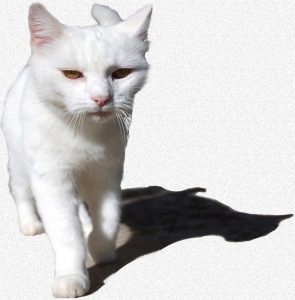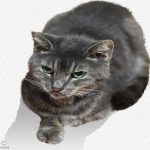Feline Chronic Diarrhea And Vomiting
Ron Hines DVM PhD


Inflammatory bowel disease (IBD) is not one disease, it is many. IBD is a catch-phrase veterinarians and physicians use to describe many conditions with similar signs but different underlying causes and presentations. That is why one treatment plan is never appropriate for all cats dealing with IBD-like issues. One thought among physician is that many cases of IBD are the result of immune system errors involving certain defensive cells of the immune system (CD8+ TRM cells). (read here & here) The thought is that the ones that reside in the walls of the intestines have mistaking harmless bacteria residing there for dangerous pathogens that need to be destroyed. As is often the case, veterinarians learn from discoveries in human medicine.
What Happens In Inflammatory Bowel Disease?
It is not unusual for your cat to occasionally vomit or have diarrhea. In longer haired cats it is often associated with hairballs. In shorter haired cats it can be due to eating new foods, stress, a virus infection or a variety of intestinal parasites. But when cats vomit too frequently, they all have a medical problem. One of the common causes is inflammatory bowel disease (IBD). If you have reached this page and are not sure that your cat’s diarrhea problem is chronic, go here.
In cats, IBD is due to long term irritation and inflammation of your cats digestive tract. Whether your cat vomits, has diarrhea or both, depends on which part of the tract is most inflamed. When it is the colon that is most affected, the problem is sometimes called colitis. Inflammatory Bowel Disease can start at at any age. But most cats that visit their veterinarian for the first time with this problem are already six or seven years old. Purebred cats might be slightly more prone to the problem.
Whatever the underlying cause, in cases of IBD your cat’s intestines become inflamed and acts as if they had been invaded by disease-causing organisms. Defensive white blood cells are set to the area to fight a perceived infection. These cells release substances (cytokines) that inflame various portions of the digestive tract causing increased blood flow, thicken and inflammation. Inflamed intestines are spastic (hypermotile) and sensitive. That is the cause of your cat’s vomiting and diarrhea. In that condition, your pet’s intestines can’t absorb food nutrients well. That can cause vitamin and other nutritional deficiencies, decreased appetite and weight loss. If the inflammatory problem is worst high in the intestine and in the stomach, cats tend to vomit. Those in which the middle portions of their intestines are most affected tend to have more watery diarrhea and weight loss. Those in which the final portion of the intestine (colon) is most affected often have mucousy loose stools, sometimes with specks of blood and straining. Cats straining to poop or pee look alike, so it is hard for cat owners to tell if this last group are straining to poop, having urinary tract issues or if they might be constipated. Although one portion of the digestive tract is affected more than another, most cats with IBD have some degree of inflammation throughout their digestive tract. Another result of loose or overly hard stools can be anal sac impactions and scooting. Stools of normal consistency, passing out the rectum, keep those sacs from overfilling.
What Signs Might I See If My Cat Has Inflammatory Bowel Disease?
Often the first hint of a problem is whey your pet starts pooping outside of it’s litter box. Symptoms of IBD come on very gradually, so the stools may look fairly well formed at the start. If the stools remain well formed over time, the issue is probably psychological. (read here) But if with time they become loose or watery, the underlying cause is intestinal inflammation. The problems tend to begin in spurts and things may return to normal for a while. Vomiting is also common and most owners at first assume that the problem is hairballs. If an OTC hairball remedy does not improve things, hairballs are not the cause.
Inflammatory Bowel Disease is usually progressive. It gets worse as time goes by. Vomiting and diarrhea become more persistent. These cats often lose weight. Some become picky eaters. A few become more hungry. If your cat refuses to eat anything except canned tuna, salmon or pungent fish-flavored cat foods it is most likely dealing with an underlying health issue. Inflamed lower intestines (colon) bleed and secrete excessive mucus. So mucus, straining and flecks of bright blood may be present on that cat’s stool. When the majority of the pathology is higher up the cat’s digestive tract (closer to the stomach), they usually pass very large watery stools with little or no discomfort, no straining, no bright blood and little or no mucus. When it is farther down toward the colon those stools tend to be smaller and more frequent. Because your cat’s pancreas and gall bladder are located close to the small intestine and interplay with the digestive tract, underlying IBD inflammation may affect them as well. I call the combination of intestinal inflammation, pancreatic inflammation and, sometimes, liver/gallbladder inflammation triaditis. Read about triaditis here. Cats with severe forms of widespread digestive tract inflammation might even turn yellowish with jaundice, have elevated liver enzymes and become severely depressed.
What Tests Might My Veterinarian Suggest?
A physical examination of your cat is important. Sometimes your veterinarian can feel that your cat’s intestines are thicker and firmer than they should be or that the lymph nodes that surround the intestines (mesenteric nodes) are larger than they should be. Your veterinarian or his/her nurse will examine a stool specimen from your cat. They will be examining the stool specimen visually and microscopically for evidence of parasites, maldigestion, blood, foreign material or other abnormalities. If nothing is found, and even if it is, most veterinarians at that point order some laboratory tests – either performed within the building or sent out to a national laboratory. In the United States, that would probably be Antech Diagnostics or Idexx. A few veterinary colleges such as Cornell or Texas A&M provide those services as well. Depending on those results, your vet might suggest an x-ray or ultrasound examination of your cat’s abdomen to check for possible intestinal motility problems. Another disease, megacolon, a ballooning of the large intestine, can cause bouts of diarrhea and vomiting as well as constipation that might be mistaken for IBD. A physical exam, ultrasound and x-rays can easily tell the two problems apart. A feline leukemia/feline immunodeficiency virus test is in order if that has not been checked recently. Your vet might suggest some diet changes to rule out a specific food allergies or intolerances. If no apparent cause for your cat’s symptoms can be found, a vet might even suggest that a stool culture be performed to rule out a rare infections with bacteria such as salmonella or helicobacter.
However making a definitive (definite/positive) diagnosis of IBD in cats requires that small snippets of your cat’s intestinal lining be sent to a pathologist for examination. That is a complicated and costly procedure. So veterinarians often make a tentative diagnosis of IBD based on your cat’s symptoms and examination findings. If intestinal biopsies are suggested, the least traumatic way to obtain them is through the use of a fiber-optical apparatus called an endoscope while your cat is anesthetized. However, their are areas of your cat’s digestive tract that are very difficult or impossible to reach with that instrument. So surgery might still be suggested to obtain mid-bowel sections. The pathologist will be able to identify which are the predominant white blood cell type(s) that are in excess in your cat’s intestine. If they are lymphocytes and plasma cells, then the cat has lymphocytic/plasmacytic or lymphplasmacytic IBD – the most common type in cats. If the pathologist sees mostly eosinophils, Eosinophilic IBD is the problem. Eosinophilic IBD is probably part of the stubborn eosinophilic complex diseases of cats. There are rarer variations of IBD that are occasionally diagnosed (suppurative [resembling pus] IBD, granulomatous IBD, regional IBD etc.).
What If I Can’t Afford All These Tests?
If you cannot afford sophisticated endoscopy/intestinal biopsy or the inherent risks of diagnostic surgery, it is entirely legitimate to request that your pet be treated with the medications and diets that are used to control IBD to see how well they control your cat’s problem. A medication that is often included in an IBD treatment plan is prednisolone , a corticosteroid. It can be quite helpful in controlling the intestinal inflammation caused by IBD. If it is useful, longer administration of a less absorbable corticosteroid might be suggested. However, occasionally corticosteroids will mask another problem associated with diarrhea and vomission, intestinal lymphoma. There is no cure for the lymphomas of cats.
No treatments veterinarians have today will cure IBD. But there are many medications and life-style changes that will control it. Some specialists feel compelled to prescribe newer, less traditional and more costly medications. After all, you took your cat to the GI specialist for fresh ideas. Some times these medications offer real benefits – but sometimes they are no better than the medications that your veterinarian has used for many years.
What Are The Common Medicines Given To Cats With IBD?
Corticosteroids
Corticosteroids are very effective in decreasing inflammation of all kinds. The most commonly used corticosteroid in cats is prednisolone although prednisone might be equally effective. It is very effective in lessening or eliminating the signs of IBD in cats with less of the side effects that are commonly seen in dogs or people. However, prolonged prednisone use can still have a number of serious side effects. One of them is weight gain and, perhaps, diabetes. So these drugs must only be used when absolutely necessary and in as small and most infrequent amount as possible. Another problem with giving too much or too frequent highly-absorbable corticosteroid such as prednisone/prednisolone/dexamethasone etc. is suppresses the immune system throughout your cat’s body – not just in its intestinal tract. These drugs can also cause fluid retention, liver changes and a number of other undesirable side effects if they are used too frequently or at too high a dose.
A corticosteroid which shows promise in IBD is budesonide (eg Entocort® EC). This steroid is marketed to treat Crohn’s disease in people. Crohn’s disease is also a form of IBD. Budesonide might cause less of the systemic side effects we associate with corticosteroid use and be less likely to cause diabetes in cats because less of it leaves the intestinal tract. It is less absorbable and, hopefully, will work mostly locally.
In stubborn (refractory) cases of IBD, two other medications that weaken your cat’s immune system are occasionally suggested. They are cyclosporin and azathioprine, two powerful immunosuppressive medications. These two drugs are not corticosteroids. They must be managed carefully with frequent laboratory tests to monitor their blood levels and effects. Both have been known to occasionally cause pancreatitis, bone marrow suppression, liver problems or cancer. These two and other similar powerful medications are most commonly used in people to weaken the immune system after organ transplants in order to prevent organ rejection. I suggest you avoid administering either of them to your cat. (read here)
Medications To Slow Down Your Cat’s Intestines
Be very cautious when using over-the-counter human medications in cats. Dogs handle common over-the-counter anti-diarrhea medicines well when the dose given is correct for their weight. But cats may not. Do not give your cat Imodium® (loperamide) ) or Lomotil® (diphenoxylate) or their generic equivalents unless a veterinarian that you trust advises you to do so. Doses of these drugs have to be very low, and even then either drugs can cause the cat to become hyperactive, depressed or have difficulty breathing. When given at too high a dose or for too long or too frequently they can both result in constipation.
Medications To Reduce Vomiting
Reglan®/Maxolon® (metacloprimide) usually works safely in cats. Although not an FDA-approved veterinary drug, it can be given intermittently when cats are having vomiting episodes and the cause is known. But Reglan® is not a long-term solution for any disease. It is available in tablet, syrup and injectable form. Some vets will dispense the injectable form in a syringe for use at home. Tablets and syrup need to be given 15-30 minutes before offering food. If that is impossible, some mix the proper dose with the food. In controlled studies, maropitant appeared more effective in controlling vomiting than metacloprimide.
Maropitant (Cerenia®)is also effective in eliminating or reducing vomiting in cats. It is FDA approved for cats. Maropitant/Cerenia® is sold as an injectable product or tablet form labeled for dogs. Injections can be painful. It should not be given to cats for more than 5 consecutive days. Neither of these two drugs should be given to your cat when there are any suspicions of intestinal obstruction.
Medications That Protect The Lining Of Your Cat’s Digestive System
Pepto-Bismol® (bismuth subsalicylate) OR ANY MEDICINE THAT CONTAINS BISMUTH SUBSALICYLATE SHOULD NEVER BE GIVEN TO CATS.
When IBD inflammation in your cat is severe enough to cause bleeding from the lining of your pet’s intestine, cimetidine or ranitidine, which decrease stomach acidity, or sucralfate which forms a protective barrier against acidity, sometimes helps. However, the antacids of the first type have the potential to let bacteria colonize upper areas of your cat’s intestinal tract where they do not belong. So I suggest that they only be given for brief periods. (read here) Sucralfate is a much safer medication. However when over-used, it can lead to constipation.
Antibiotics That Sometimes Help
Metronidazole
Metronidazole (Flagyl®), often helps control symptoms in cats that have IBD or similar digestive tract issues. Metronidazole not only kill harmful bacteria and protozoa that might be compounding your cat’s problem (eg giardia), it seems to improve diarrhea through mechanisms as yet unknown. If your veterinarian dispensed metronidazole, give the drug a few weeks time before judging its effectiveness. Metronidazole will cause some cats to vomit or lose appetite. It tastes terrible, so it is often sold in small capsule form. In cases where it was dispensed in the less expensive pill form, reducing the dose, wrapping it in something tasty or having an online pharmacy attempt to disguise the taste is another option. If the medicine is not in a capsule or pharmacy-prepared with taste-disguising additives, expect your cat to drool and avoid your next attempt. I am told that there is a non-bitter form of the drug, metronidazole benzoate, but long-term use of benzoate products in cats may not be a good idea. Some compounding pharmacies sell metronidazole in a transdermal gel form. There are mixed thoughts as to whether enough drug actually gets into your cat’s system that way. The only thing I can suggest is to give it a try and see.
Tylosin
Another antibiotic, tylosin (Tylan®), sometimes aid in controlling IBD diarrhea when it is added to your pet’s food or given in capsule form. It, like metronidazole, is quite bitter. Tylosin’s primary use in the United States is to treat bacterial intestinal infections in chickens, turkeys and swine and as a growth stimulant in feedlot cattle. In those species, it is added to their drinking water. It is not approved for use in cats or dogs but many veterinarians dispense it to cats and dogs with loose stool issues “off label”. As with all antibiotics, bacteria eventually become resistant to tylosin. (read here) Some folks attempt to place the powder in capsules or chilled butter to hide the taste. But if powder is exposed on the outside of the the capsule, you cat will detect it. I only suggest a trial on either of these two medications when diet change and the less-absorbable corticosteroids are not keeping your cat’s IBD problem under control.
Sulfasalazine
Sulfasalazine is a sulfa-based antibiotic. However, it also has anti-inflammatory actions inside your pet’s intestine. It is unclear how it accomplished that. Because sulfasalazine is poorly absorbed, it does not have the level of side effects that corticosteroids do. So it is often tried in the treatment of IBD before resorting to a corticosteroid. I would give it a try before resorting to long-term corticosteroid therapy and save the corticosteroids for flareups. I suggest that initial doses of the drug need be quite low – lower than what is generally thought to be the effective dose. That is to see how your cat tolerates it. Then slowly increased to an accepted therapeutic dose.
What About A Diet Change Or Special Diet For My Cat?
Changes to your cat’s diet is always the best place to begin when dealing with any long-term digestive tract problem. For an occasional lucky cat, it is all that needs to be done. There are innumerable diet choices. Some were designed to treat food allergies (hypoallergenic). Others contain a novel meat source (duck,rabbit,etc.). Still others are formulated from bland ingredients less likely to irritate the intestines. Many include enhanced levels of vitamins and omega-3 fatty acids. Some have increased fiber content, others reduced fiber content. Some cats seem to do better on a lower fat diet. Only a trial of a month or so will tell. Two of my clients’ cats did best on a home made diet of finely ground whole Cornish hens and an added commercial feline vitamin supplement. Many diets like those you can prepare yourself at home with the aid of a veterinary nutritionist such as those at BalanceIT. Many veterinary schools also keep an available veterinary nutritionist on board. In most cats, diet will be only a part of a successful plan to deal with your cat’s digestive tract issues.
Over time, fibrous tissue can accumulate in the walls of your pet’s intestine and other changes can occur that make it harder for your cat to absorb essential nutrients and vitamins. Because of that and due to poor appetite, your cat might have difficulty maintaining its healthy body weight on. You can compensate for this with and extra-nutritious diet and supplemental vitamins. (read here)
Can My Cat Be Cured?
Dealing with confirmed IBD in your pet requires a great deal of patience and dedication. Occasionally owners see their cat’s digestive problems go away – with or without treatment. I believe that most of those probably did not have true IBD in the first place. In true IBD veterinarians can control the problem, but we can not cure it. That is because the underlying biochemical defects that make your cat prone to IBD are not understood in pets or people. But once you have worked out a nutrition and life-style plan for your cat, with the aid of medication it is a problem you both can live with. There will probably be flare ups. There will probably be setbacks. Since inter-cat stress is often involved, some of these cats do best in a single cat household.
A Microbiota transplant (FMT)?
Frequent exposure to antibiotics changes the bacterial & protozoal content of your cat’s digestive tract. Sometimes those changes are not for the best. Probiotic and prebiotic pastes that veterinarians sell only contain a few species of the bacteria that inhabit the intestines of healthy cats. Once a cat has every bit of antibiotic out of its system, the best way to restore a health bacterial flora is cohabitation and shared food and water containers with another healthy cat. (read here)
IBD is also one of the most common cause of persistent diarrhea in people. So considerable effort is being made to find better medications to treat it in us. Some of those medications might be found to help our pets as well. Eluxadoline (Viberzi®, Truberzi®) is one of them. It is now approved for humans with IBD. It was found to be effective in halting diarrhea in laboratory mice. I do not know if it has been tried yet in cats. If you do, please let me know.
You are on the Vetspace animal health website
Visiting the products that you see displayed on this website help pay the cost of keeping these articles on the Internet.



